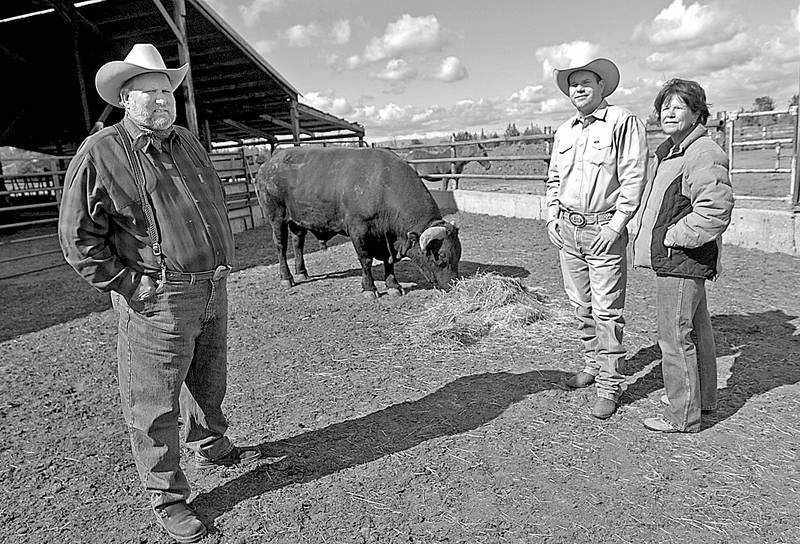Discerning consumers seek out Redmond’s Kobe beef
Published 5:00 am Monday, October 8, 2007

- R.L. Freeborn, left, with son Ty Freeborn and wife Susie Freeborn, is managing partner of Redmond-based Kobe Beef America LLC. Behind them is one of the Wagyu cattle that the company raises to produce its high-quality kobe beef.
REDMOND — Looking at an 1,800-pound bull at R.L. Freeborn’s 200-acre ranch north of town, it doesn’t look much different from a typical Black Angus bull.
But Shadosha is a full-blooded Japanese Wagyu breed of cattle, said Freeborn, managing partner of Redmond-based Kobe Beef America LLC.
Trending
Wagyu, which means Japanese cow, is bred for its fatty marbling throughout the muscle and its rich, buttery taste, Freeborn said.
Kobe Beef America’s purebred Wagyu cattle are crossbred with Black Angus cattle. They are fed a vegetarian diet without hormones to produce a more desirable steak for the American palate, he said.
Its “superior genetics” result in higher-quality meat for the consumer than the typical Angus steak, he said.
“As the food industry has changed to a more healthy, high-quality, locally grown food, the consumer has become more discerning about what they will buy,” Freeborn said. “They pay more for high-quality cheese and wine, and they will pay a substantial premium for beef items based on (their) eating qualities.”
Most of Central Oregon’s $46.1 million cattle industry is sold on the commodities market, said Mylen Bohle, an area extension agronomist for Oregon State University, based in Prineville.
“But there are a number of folks wanting to market direct to the consumer,” Bohle said. “People want a safe product, and they want to know where their food comes from.”
Trending
Jere Breese, owner and vice president of Pilot Butte Hereford Ranch Inc. in Prineville, says people will pay more for local meat as long as it tastes right.
He sells grass-fed beef directly to consumers at farmers’ markets and at his ranch, he said.
“If you can find the right niche, it’s going to be a seller,” Breese said.
Customers have marveled over the dish, “Kobe Beef and a Hot River Rock,” a $15, 3-ounce cut of meat served at Deep restaurant in Bend, said Jody Denton, chef and owner. Diners sear the beef over the hot rock,
Deep is patterned after modern Japanese-style restaurants in New York, where the prices for Kobe beef are much higher, Denton said.
“It sells like crazy,” Denton said. “It’s just nuts. It’s our number one selling dish.”
At Freeborn’s sprawling ranch, just a mile or two away from the new Wal-Mart Supercenter, he and his son, company Vice President Ty Freeborn, breed Wagyu cattle using different genetics to determine which bulls produce the highest-quality offspring.
The company sends bulls to 18 different ranches throughout the country, a process that populates the herd with between 8,000 and 10,000 calves per year, Freeborn said.
Angus cattle typically take between 90 and 120 days of feeding to get to about 1,250 pounds, Freeborn said. Wagyu cattle take between 240 and 360 days of feeding and are harvested at between 1,400 and 1,500 pounds, he said.
The longer feeding process gives the animals a higher grade of marbling than seen in Angus beef, he said.
After the cattle are raised elsewhere, Freeborn’s Kobe Beef America buys them back, continues feeding them at feedlots in Montana and Nebraska, and sells them for slaughter and processing in Nebraska. Then, the beef is sold directly to restaurants, hotels and upscale grocery stores throughout the United States, Canada, Mexico, Singapore and Taiwan, Freeborn said.
“We cater to two markets,” Ty Freeborn said. “There are people who want to eat the best steaks they ever ate, and there are people who want to know where their food came from. People will pay a premium for each.”
Kobe Beef America’s products, which Freeborn began to sell online two weeks ago at www.kobe-beef.com, range from a $10-per-pound hamburger to a $100-per-pound filet mignon, he said.








